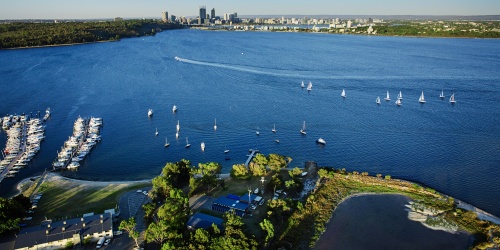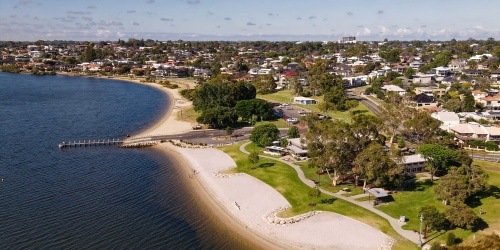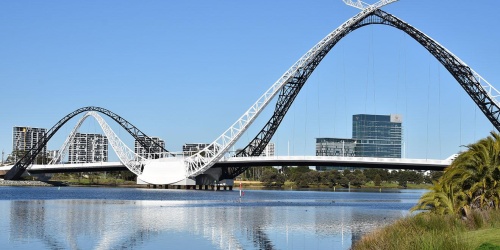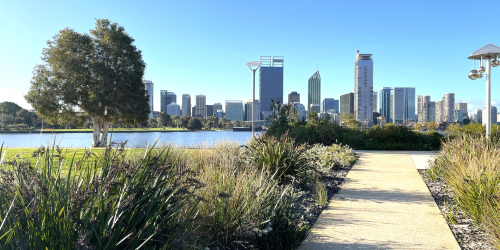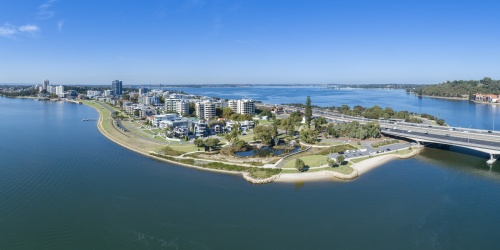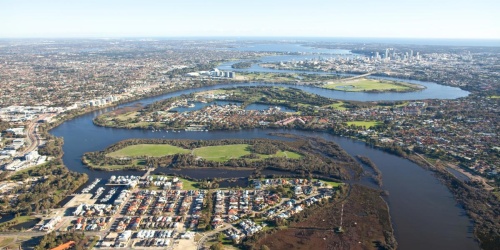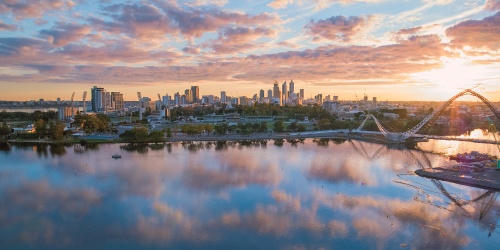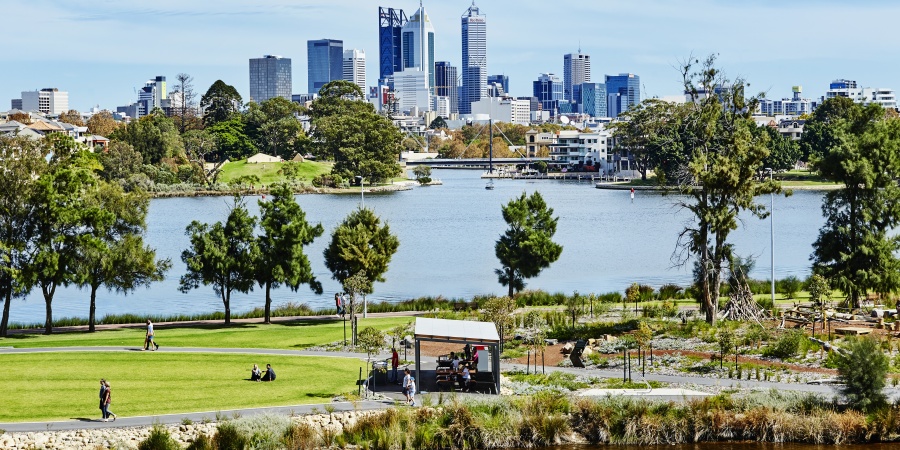
General questions (applies to all applications)
How do I find out where my proposal is located with respect to the Development Control Area (DCA)?
The application process that development and other activities in and around the Swan and Canning rivers are subject to, depends on the location of the proposal with respect to the Swan Canning Development Control Area (DCA).
Refer to the Swan Canning Development Control Area page for information on the DCA.
What information should I include with my application?
A checklist is included on each of the application pages and is also incorporated into the application forms.
Read more about:
If insufficient information is provided with your application, DBCA will seek further information in order to undertake the assessment. If the required information is not provided, the application will be returned. DBCA is unable to process an application without the completed (and correct) application form and relevant information.
Is there a fee for lodging an application?
DBCA does not currently charge fees for applications.
How do I find out who the landowner / land manager is?
If your proposal is on a public reserve, the local government is most likely the landowner / land manager.
For proposals within the River reserve, the Swan River Trust is the vested landowner. DBCA will arrange signature on behalf of the Swan River Trust when the application is submitted. However, signature of the Trust is unlikely to be provided if an application is not consistent with DBCA’s policies, plans and guidelines manual. If this occurs, we will contact you to discuss modifications to your proposal.
If you are unsure, please contact us on 9219 9000 or at rivers.planning@dbca.wa.gov.au and provide the full address of your proposed development.
Where do I lodge my application?
Permit applications should be lodged directly with DBCA at rivers.planning@dbca.wa.gov.au.
Applications for development must be lodged with the local government, who will then send the application on DBCA. For development applications, please email your completed application form, and any additional information, to the local government and CC rivers.planning@dbca.wa.gov.au so that DBCA is aware that the application has been submitted. The local government has seven (7) days to send the application through to DBCA.
For applications that are not processed by DBCA, please refer to your local government website.
How do I find out the status of my application?
Permit applications may take 28 days to process (however, more time may be required for complex or unique proposals). You will be notified if any further information is required or if it is recommended that your application be modified.
For Part 5 development applications, you will be notified as your application progresses through each stage of the Part 5 approvals process.
If you would like an immediate update on your application, please contact DBCA’s Swan Canning Waterways Branch, Statutory Assessments Unit, on 9219 9000 or at rivers.planning@dbca.wa.gov.au.
Are there any other approvals I may need?
DBCA will advise of any other approvals that may be required under the Swan and Canning Rivers Management Act 2006 and Regulations, or the Conservation and Land Management Act 1984 and Regulations. However, you may require additional approval from the land manager (usually the local government). We will advise you if we are aware of any local government approvals you may need. Overall, it is your responsibility to ensure you have all required approvals before starting works or commencing a commercial operation.
For more information contact DBCA's Swan Canning Waterways Branch, Statutory Assessments Unit, on 9219 9000 or at rivers.planning@dbca.wa.gov.au.
Who will DBCA refer my application to?
As part of the assessment process, DBCA may seek advice from other planning authorities, government agencies, contractors, consultants, or other stakeholders, as well as DBCA’s own specialist branches and regional locations. Where expertise is available from within the department it will be utilised prior to seeking advice from external parties.
The following is a list of local government authorities that are connected to the rivers and are likely to be involved with applications on land they manage:
Local government | Website |
City of Armadale | |
Town of Bassendean | |
City of Bayswater | |
City of Belmont | |
City of Canning | |
Town of Claremont | |
Town of East Fremantle | |
City of Fremantle | |
City of Gosnells | |
City of Kalamunda | |
City of Melville | |
Town of Mosman Park | |
Shire of Mundaring | |
City of Nedlands | |
Shire of Peppermint Grove | |
City of Perth | |
City of South Perth | |
City of Swan | |
Town of Victoria Park | |
City of Vincent |
The following state government agencies and utilities are often asked to review applications where more technical information is required:
Government departments or utilities | Provide advice relating to: |
The Department of Water and Environmental Regulation |
|
Department of Planning, Lands and Heritage |
|
Department of Transport |
|
Water Corporation |
|
What role do Aboriginal traditional owners have in the Swan Canning Riverpark?
Aboriginal people have a connection to, and an ongoing interest in, the care of lands and waters of WA’s national, marine and conservation parks.
It is important that Aboriginal people can express and maintain their culture and connection to country. DBCA is committed to providing opportunities for Aboriginal people to help manage and promote parks through joint management arrangements and other partnerships, and by providing Aboriginal tourism opportunities.
In managing the Swan Canning Riverpark, DBCA has a responsibility to recognise the interests of the Aboriginal community that has an association with the Swan Canning Riverpark and to provide for their participation in the management of those areas and the management of activities affecting the ecological and community benefits and amenity of those areas.
Commercial operators in the Swan Canning Riverpark are encouraged to consider how Aboriginal culture, heritage and values may be acknowledged in their commercial activities, and to consider employing or partnering with Aboriginal people.
The Swan River is a known Aboriginal site of significance. Disturbance of a significant site may require consultation with the traditional owners and approval under the Aboriginal Heritage Act 1972.
What is a Schedule 5 Authority?
A Schedule 5 authority means a person listed in Schedule 5 of the Swan and Canning Rivers Management Act 2006. This includes the departments principally assisting in the administration of the following Acts, and any other person carrying out functions under the following Acts, to the extent that their functions relate to matters affected by the following Acts:
- the Bush Fires Act 1954;
- the Community Titles Act 2018;
- the Environmental Protection Act 1986;
- the Fire and Emergency Services Act 1998;
- the Fish Resources Management Act 1994;
- the Forest Products Act 2000;
- the Health (Miscellaneous Provisions) Act 1911;
- the Hope Valley-Wattleup Redevelopment Act 2000;
- the Jetties Act 1926;
- the Land Administration Act 1997;
- the Local Government Act 1995;
- the Main Roads Act 1930;
- the Marine and Harbours Act 1981;
- the Metropolitan Redevelopment Authority Act 2011;
- the Mining Act 1978;
- the Planning and Development Act 2005;
- the Port Authorities Act 1999;
- the Public Transport Authority Act 2003;
- the Rights in Water and Irrigation Act 1914;
- the Shipping and Pilotage Act 1967;
- the Soil and Land Conservation Act 1945;
- the Strata Titles Act 1985;
- the Transport Co-ordination Act 1966;
- the Water Agencies (Powers) Act 1984;
- the Water Corporations Act 1995;
- the Water Services Act 2012;
- the Waterways Conservation Act 1976;
- the Western Australian Land Authority Act 1992.
Additionally,
- The Conservation and Parks Commission established under the Conservation and Land Management Act 1984.
- The Forest Products Commission established under the Forest Products Act 2000.
- A local government or commissioner appointed under the Local Government Act 1995 to administer that local government.
- The Commissioner of Main Roads appointed under the Main Roads Act 1930.
- The National Trust of Australia (W.A.) established under the National Trust of Australia (W.A.) Act 1964.
- The Commissioner of Police appointed under the Police Act 1892.
- The Public Transport Authority of Western Australia established under the Public Transport Authority Act 2003.
- The Commissioner for Soil Conservation appointed under the Soil and Land Conservation Act 1945.
- The Western Australian Land Authority established under the Western Australian Land Authority Act 1992.
- The Western Australian Planning Commission established under the Planning and Development Act 2005. 16.
- A licensee as defined in the Water Services Act 2012 section 3(1).
- The holder of a licence under the Electricity Industry Act 2004.
- The holder of a distribution licence under the Energy Coordination Act 1994.
- Any decision-making authority as defined in the Environmental Protection Act 1986 section 3.
Questions for Part 5 development approvals
How long will it take for my application to be determined?
The timeline for assessing development applications is variable and depends on the quality of information provided with the application and how complex the proposal is.
The Part 5 development assessment process is likely to take 5-6 months from the time that a valid application is lodged.
Key aspects of the approval process include:
- local government forwards application to DBCA (7 days)
- referrals to relevant agencies (42 days)
- first draft report preparation
- consideration at Swan River Trust Board meeting (board meetings held once a month, agenda closes two weeks prior to meeting)
- web advertising of draft report to allow public comment on proposal (2 weeks)
- amend draft report if responses received during advertising
- the Swan River Trust Board may be consulted on the responses received during advertising
- review and adopt final report
- Ministerial decision
The timelines above are approximate. They provide a general indication for forward planning of a development application.
What if I don’t agree with the conditions on my development approval?
If you have received an approval and do not agree with one (or more) of the recommended conditions, you can submit a request for reconsideration to the Minister.
To submit a request for reconsideration of a condition please contact DBCA in writing at rivers.planning@dbca.wa.gov.au within 28 days of receiving notification of your approval and include:
- Title your email “Request for reconsideration of conditions” with your approval number (the file number written on the determination)
- Attach a copy of, or a link to, the determination (your approval) signed by the Minister
- Which condition(s) you do not agree with and why
The Minister may respond with a decision where:
- No changes are made to the condition(s) in question
- The condition(s) is altered
- The condition(s) is removed
If the condition(s) in question has been altered or removed, then DBCA is required to notify all agencies who were referred the application and must publish the amendment on its website.
How long will my approval last?
Development approvals determined under the SCRM Act do not expire, but will include the following condition:
- Approval to implement this decision is valid for two (2) years from the date of this approval. If substantial on-site works have not commenced within this period, a new approval will be required before commencing or completing the development.
This means that your approval will expire if no works have started within two years after the date that the approval was signed by the Minister. If your approval expires, then a new Part 5 development approval will be required.
What if I can’t commence works within two (2) years? Or what if I want to make a change to the plans that were approved?
If your circumstances change and you require an extension to your approval, or you need to slightly alter the plans that were approved as part of your proposal, then you will need to apply for a Variation of extension of approval under Section 84 of the SCRM Act.
To apply for an extension or minor variation, please contact DBCA in writing at rivers.planning@dbca.wa.gov.au and include:
- Title your email “Request for extension/variation” with your approval number (the File Number written on the determination)
- Attach a copy of (or a link to) the determination signed by the Minister (your approval)
- Advise whether you are applying for a minor variation or an extension
- If applying for a minor variation, then include details on what changes you are proposing as well as updated plans to reflect these changes
Based on the information provided, you will be advised if your request can be processed under Section 84 of the SCRM Act. If your proposed variation is not considered ‘minor’, then you may be required to apply for another Part 5 development approval.
Please be aware that a request for extension will grant no more than 12 months extension and can only be given once for any approval. After that time has expired, a new Part 5 development approval will be required.
Please refer to the Swan River Trust Guideline SRT/A1 – Variation or extension of approval applying Section 84 for information on what is considered a ‘minor variation’ and a flow chart of the Section 84 process. This information is available on the Policies, plans and guidelines manual page.
Questions for non-commercial permit applications
Do I need approval to hold a spectator event in the Development Control Area?
Unless your event is being held in a Swan Estuary Marine Park, no approval from DBCA is required as long as you have approval from the Department of Transport under the Navigable Waters Regulations 1958 Regulation 51C for an on-water spectator event and associated temporary infrastructure.
Similarly, if you have approval from the land manager of the reserve (usually the local government) for a spectator event and associated temporary infrastructure being held on-land, approval from DBCA is not required.
If you’re unsure, please contact DBCA’s Swan Canning Waterways Branch, Statutory Assessments Unit, on 9219 9000 or at rivers.planning@dbca.wa.gov.au.
Do I need approval for repairs and maintenance?
A permit is required for any repairs and maintenance works being carried out on structures within the DCA or over water, this is to ensure that works include preventative measures (such as the installation of a silt curtain) to protect the river.
Repairs and maintenance is considered works that do not change the appearance or function of a structure. If you are proposing to change the appearance or function of a structure (e.g. add an extension to a jetty), then a different type of approval may be required.
If you’re unsure, please contact DBCA’s Swan Canning Waterways Branch, Statutory Assessments Unit, on 9219 9000 or at rivers.planning@dbca.wa.gov.au.
Do I need approval for erosion control works (on public and private property)?
A permit is required for the installation of erosion control structures, even on private property. This is to ensure that the proposed structures are appropriate and that any works include preventative measures (such as the installation of a silt curtain) to protect the river.
No permit is required for like-for-like repairs to erosion control structures. However, upgrades or alterations will require a permit.
If you’re unsure, please contact DBCA’s Swan Canning Waterways Branch, Statutory Assessments Unit, on 9219 9000 or at rivers.planning@dbca.wa.gov.au.
Is there a time limit on how long a permitted temporary structure can be in place?
Yes, a structure can only be permitted as ‘temporary’ for no more than 6 months.
I’m a leaseholder, what works can I undertake via a permit?
A permit can be issued for works, acts and activities by a leaseholder of land or waters in the DCA provided the cost is less than $500,000.
Works costing over this amount will require a development approval issued by the Minister for the Environment under Part 5 of the Swan and Canning Rivers Management Act 2006.
Does the removal and / or trimming of vegetation require a permit?
Yes, generally the removal and/or trimming of vegetation, including for preventative fire hazard reduction, within the DCA requires a permit.
What approvals are required for dredging in the Swan Canning Development Control Area?
Maintenance dredging that is necessary for the maintenance of access by vessels to marinas and jetties in the Riverpark can be undertaken via a permit approval.
Dredging that is not for maintenance purposes requires a development approval issued by the Minister for Environment under Part 5 of the Swan and Canning Rivers Management Act 2006.
Questions for commercial operations permit applications
Why do I need a permit to operate my commercial activity in the Swan Canning Riverpark?
Permits allow tourism activities to be assessed, authorised, managed and monitored. These permits have conditions or terms that must be met by businesses operating in the Swan Canning Riverpark and are designed to ensure that commercial activities complement the Riverpark and do not negatively impact on the environment, amenity, community values and shared use of the area. Safety also needs to be considered. All commercial activities in the DCA require a permit.
Which agency grants permits and leases for the Swan and Canning rivers?
The Department of Biodiversity, Conservation and Attractions (DBCA) is the State Government agency that has planning, protection and management responsibilities for the Swan and Canning rivers and associated land, collectively known as the Swan Canning Development Control Area. For more information please visit our Riverpark development and planning page.
Are there any other approvals I may need from DBCA for my commercial activity in the Swan Canning Riverpark?
If development of infrastructure is required to support a commercial activity, a Ministerial approval under Part 5 of the Swan and Canning Rivers Management Act 2006 may be required.
Riverbed leases are used to authorise activities that require the exclusive use of a site in the river to support the business operations, such as commercial jetties or overwater restaurants. New leases granted over the River reserve must be consistent with a Part 5 development approval for the supporting infrastructure. Commercial rates are charged for the lease.
Long term use of land in the Swan Canning Riverpark may require approval and a licence or lease from the relevant land manager. This is usually the local government authority.
Other licences or certificates from government agencies may also be required for your commercial operation such as a jetty licence, liquor licence, a Certificate of Survey or trading permit.
For more information contact DBCA Swan Canning Waterways Branch, Statutory Assessments Unit, on 9219 9000 or at rivers.planning@dbca.wa.gov.au.
If I have a T-Class licence issued under the Conservation and Land Management Act (CALM Act) for activities in the Swan Estuary Marine Park, do I still need a permit under the Swan and Canning Rivers Management Act 2006 (SCRM Act)?
Regulation 17(2)(b) of the Swan and Canning Rivers Management Regulations 2007 states a permit is not required if the commercial act or activity is undertaken in accordance with a licence issued under section 94 of the CALM Act. Note, this applies if the approved commercial activity occurs within the Swan Estuary Marine Park only. The Swan Estuary Marine Park encompasses:
- Alfred Cove, 200 hectares adjacent to the suburbs of Attadale and Applecross;
- Pelican Point, a 45 hectare area in Crawley; and
- Milyu, 95 hectares adjacent to the Como foreshore.
For example, if a stand-up paddle board operator is only operating in a CALM Act Marine Park and has an approval under the CALM Act to do so, a SCRM Act permit would not be required. If a stand-up paddle board operator also wanted to operate from other locations in the Swan Canning Riverpark, outside of the marine park, a permit under the SCRM Act would also be required.
Why do I have to apply through a competitive process for some permits and leases?
A competitive process may apply to the grant of some permits and leases. This is the fairest way to grant the permit or lease opportunity to the most competitive applicant and to ensure the best outcomes are obtained for the community through a transparent process.
A competitive process may apply to the grant of permits that are restricted in number or for riverbed leases. For example, a competitive process was run for the commercial operation of seaplanes on Perth Waters to select the most suitable operator.
If you have questions about whether a competitive process may apply to your proposal, please contact DBCA's Swan Canning Waterways Branch, Statutory Assessments Unit, on 9219 9000 or at rivers.planning@dbca.wa.gov.au.
Still have questions?
If you have read through the frequently asked questions and require assistance, please contact DBCA’s Swan Canning Waterways Branch, Statutory Assessments Unit, on 9219 9000 or at rivers.planning@dbca.wa.gov.au.
